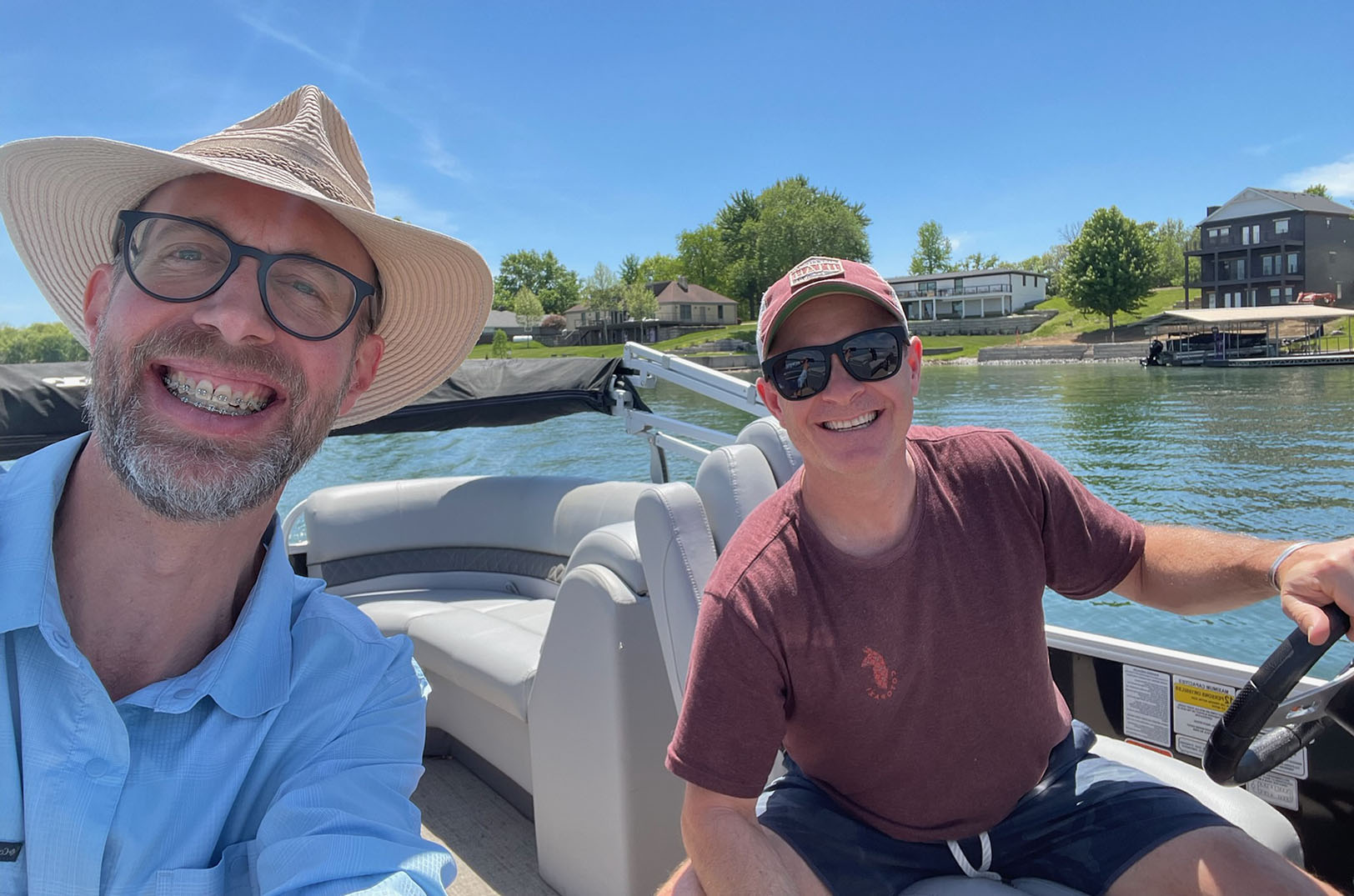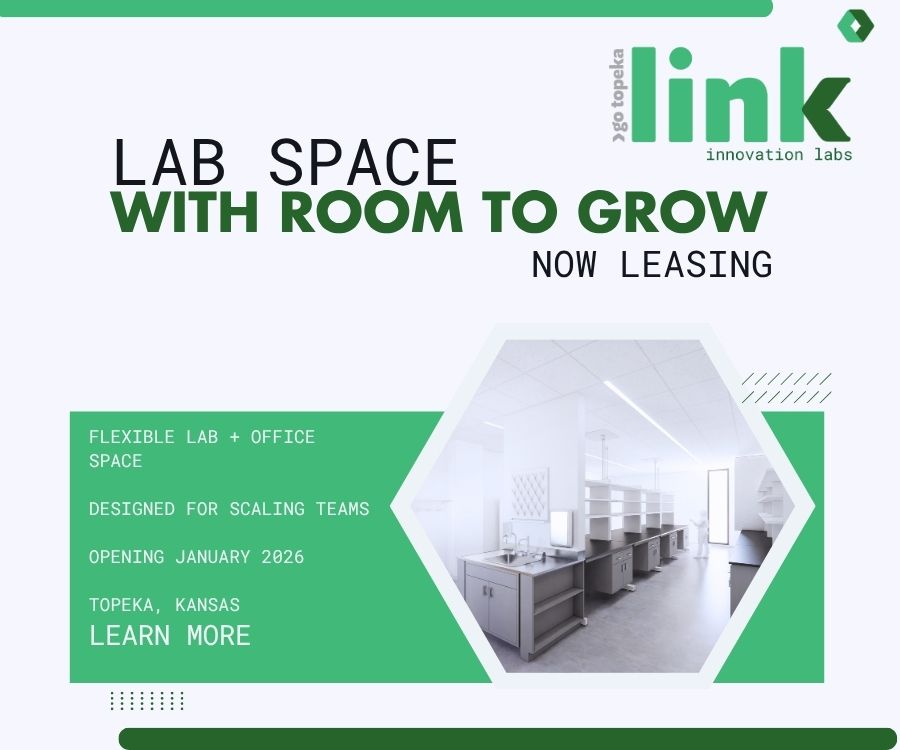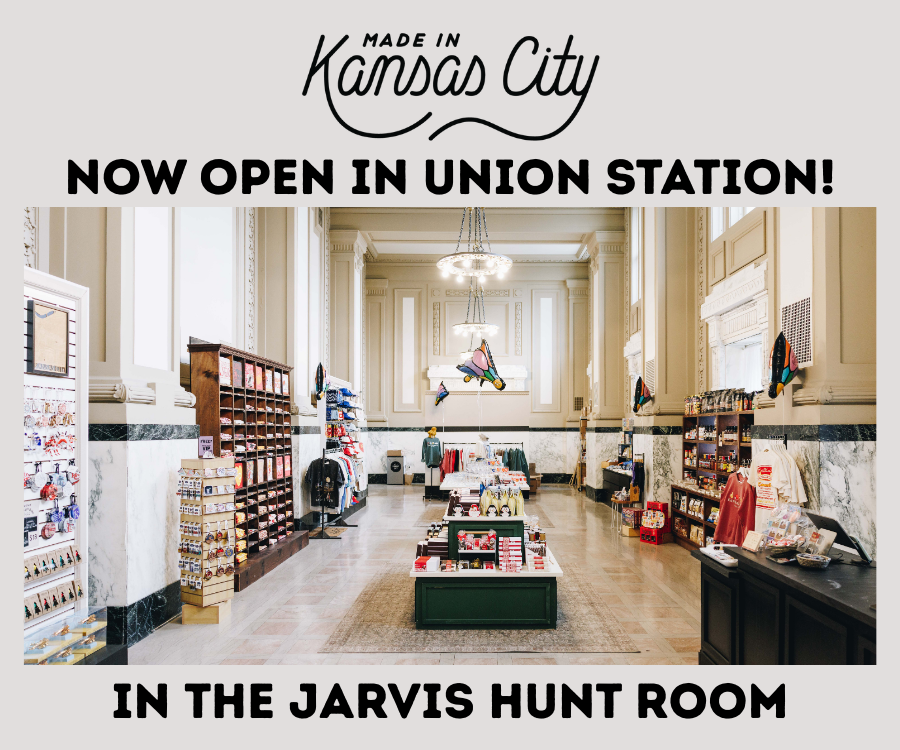Editor’s note: Startland News — officially launched May 4, 2015 — is marking its 10-year anniversary this spring. As part of this observance, the nonprofit newsroom is taking a look back at pivotal moments in its decade-long run, as well as impact along the way.
Longtime editor-in-chief Tommy Felts caught up with Stuart Ludlow and David Hulsen — the co-founders featured in the first-ever startup story on Startland News’ website — to reflect on how early and ongoing coverage aided the journey of RFP360 (rebranded from RFP365).
Their Kansas City Startup Village-based tech company — a software platform that managed the entire request-for-proposal (RFP) lifecycle and later relocated further down the state line to Leawood — exited in 2021. Ludlow is now co-founder at CTO of VeloVisa; Hulsen is COO of Celerity Enterprises.
‘My mother even framed it’ — Why Startland News’ first-ever startup story still resonates after a decade
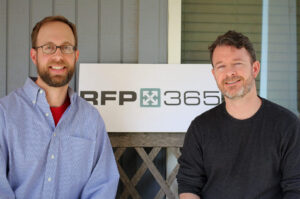
David Hulsen and Stuart Ludlow in 2015 outside the State Line Road offices of then-RFP360; photo by Bobby Burch, Startland News
QUESTION: Your company, RFP360, was featured as Startland News’ first startup story; in hindsight, what impact did that initial article — and other early stories that followed — have on you and the company?
DAVE: Looking back, the entire company journey seems really fast, but each day was really long. Back in May 2015, we were just trying to survive.
STU: That first article came at a great moment for us. Dave and I were riding high after raising $950,000 and signing a deal with Kansas City, but we were still very much the new kids on the block.
I remember being incredibly nervous — it was my first media interview ever. We were so naïve and driven; we just jumped at any chance for local exposure. Little did I know that the photo of Dave and me sitting on that bench would become part of our company’s early lore — my mother even framed it.
At that time, the Kansas City Business Journal wouldn’t give startups like us the time of day unless you were Sprint or Cerner, so Startland News filled a crucial gap by sharing our small victories. We didn’t have a specific outcome in mind for the interview beyond hoping someone might notice us, but in retrospect, it helped establish us as legitimate players in the local ecosystem.
DAVE: Any press we could get was good, as we had a nice inbound/organic process going on. We were also living on the vibes of the startup community in Kansas City. There was so much support, it was just natural to work with Startland News. It was then, and is now, a publication I read regularly.
Q: How did ongoing coverage of RFP365 — and later RFP360 — contribute to the evolution of your startup?
DAVE: Actually, and this is confusing, we started as “RFP365” because someone was squatting on the name “RFP360.” Eventually Stu bought RFP360 as a surprise gift. Amazing.
I’ll put it this way: When we sold the company, I saved all of the Startland News articles I could find to show my kids when they get older. Even though we sold software worldwide, the support and excitement was local. And that local outlet was Startland News. The other publications were too broad and we were way too small to garner any interest anyway.
STU: Being part of the Kansas City Startup Village gave us a geographic advantage that translated into media attention. That consistent coverage helped maintain our visibility in the local market, which I suspect played some role in our fundraising success — every dollar of our investment came from Kansas City.
Beyond funding, the ongoing coverage helped document our growth story. The coverage brought in a few famous faces from Daymond John (Shark Tank), Steve Case (AOL), and Brad Feld (serial entrepreneur, Techstars). Steve and I won a game of foosball in our living room.
Q: What has Startland News taught you about Kansas City’s startup and business community?
DAVE: We live in a world where the news media is (and has) changed dramatically. I remember my mom reading the local (small town) newspaper every evening. There was national news, of course, but local news was critical. Startland News was always ‘that’ for me in Kansas City. Local, relevant, real. I live in Colorado now and still read Startland News. I don’t know all of the names of people and companies anymore, but I sit on the sidelines and cheer them on.
STU: Startland News showed me how vibrant and supportive the KC startup community could be, especially in those earlier days.
I genuinely miss the scene from a decade ago — it felt more collaborative and centralized back then. Founders had specific places where we all congregated, creating this wonderful sense of community that’s harder to find now, despite there being more startups than ever.
Startland News’ coverage has also highlighted how the ecosystem has evolved over time, though I sometimes wonder if we’ve lost some of that core feeling of collaboration that made KC special. There’s a “pipeline” of programs now, but many feel like they haven’t changed in a decade. We need fresh approaches to fostering innovation.
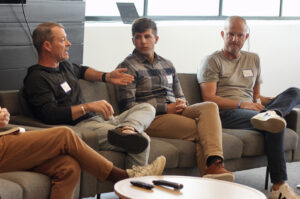
Stuart Ludlow, a thrice-exited founder, speaks during a September 2024 Tech Venture Studio Sound Bytes session on equity and exit planning alongside attorney Gabriel Riekhof, Husch Blackwell, and Serial tech entrepreneur Tony Caudill; photo by Nikki Overfelt Chifalu, Startland News
Q: You’ve continued to support Startland News in the years after your exit; what’s resonated with you about our newsroom?
DAVE: I’ve mentioned this theme already: community.
Startland News was at every startup event I went to. It was a core member of the Startup Village. I still get chills thinking about how amazing and fun those times were. I’ll never see anything like that again, so organic and honest … and humbling. Many of us had the gift of geographic proximity. And Startland News strengthened this digitally.
STU: After our exit in 2021, I wanted to give back to the community that supported us. I spent a couple of years volunteering with Digital Sandbox KC and trying to help other startups (with admittedly mixed results). Throughout that time, Startland News remained the consistent voice championing local innovation.
What resonates most is how Startland continues to shine a light on emerging companies that mainstream business publications might overlook — just as they did for us in the beginning. That early coverage matters tremendously to founders who are working hard to build something new.
Q: Anything else you’d like to share at this 10-year mark?
STU: The startup journey never really ends and doesn’t really get easier. (After RFP360, I’ve launched a new venture called VeloVisa, helping professional sports teams manage the legal immigration of their athletes. We’re currently focused on MLB and NHL teams but are expanding to serve a wider audience.)
DAVE: Startland News reminds me that we as entrepreneurs are not alone. There are others out there. When you wake up in a cold sweat in the middle of the night, take comfort that you can find someone else to talk to about this.
On numerous occasions, I have reached out to leaders of companies I read about in Startland News. How can I help? Do you want to talk?
Happy 10th birthday, sorry you aren’t old enough for a cell phone yet.




